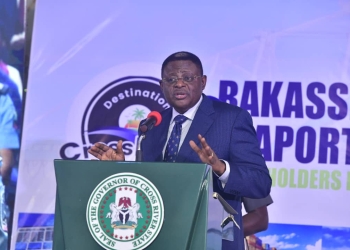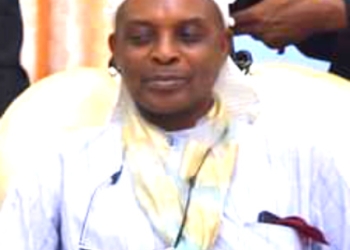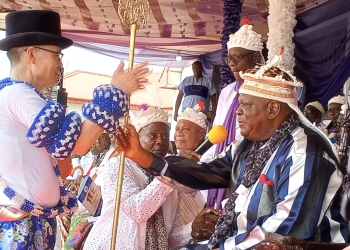By Anietie Akpan
As the world celebrated the 2025 International Day of Education, investigations have shown that Cross River state is yet to be Artificial Intelligence (AI) Education compliant.
Findings by Pillar Today also revealed that the state government does not have AI Education in its curriculum as most secondary school students spoken to exhibited crass ignorance of AI education.
However it was confirmed that through the financial and other supports from the United Nations Children Fund (UNICEF), the state has embraced the Nigerian Learning Passport (NLP) programme.
The 2025 International Day of Education inspires reflections on the power of education to equip individuals and communities to navigate, understand and influence technological advancement.
Hence the theme for this year is: “AI and education: Preserving human agency in a world of automation”.
Giving an overview on “AI in Education, International Day of Education, Nigeria”, the UNICEF Education Specialist,, Enugu Field Office, Dr. Agatha Nzeribe defined AI and Education as programs or machines that simulate tasks that typically require human intelligence, such as:making predictions, generating content, providing recommendations.
She said education with AI is:a “personalized learning allowing more practice problems for struggling students, more advanced concepts for students who are ahead, a tool to enhance and support teachers’ roles, aligned with ethical and privacy considerations.and it (enables) inclusive, catering to students with disabilities”.
Contrary to some beliefs, Nzeribe said, “AI Education is not replacing teachers, going to solve every problem, a one-size-fits-all approach to teaching and learning, limited to english or a single cultural perspective”.
Giving statistics of Nigeria’s AI and Education Landscape she said, the population under 25 years is 60 percent and their Internet penetration is 48 percent (2025 projection). However, dgital literacy rate is improving but urban-rural divide persists, she added.
She said, the main challenges have been Infrastructure limitations, Lack of skilled educators, Digital divide, and Policy and regulatory gaps (such as ethical concerns).
In view of this, Nzeribe called for action on the part of governments which includes to drive innovation, Policy formation/implementation, Infrastructure development, Regulation and oversight, adopt AI tools
For the teachers and educators, she said they should adopt AI tools, get Feedback and customization, and facilitate digital literacy.
While for the students, Nzeribe charged them to do active participation, engage in skill development and feedback.
For the tech industry and developers, she charged them to engage in tool development, training and support, and collaboration with relevant stakeholders.
On the use of AI education in Cross River State, findings showed that secondary school students and teachers are not familiar with the use of AI technology in education as sources in the Ministry of Education said, there is no AI Education in the state’s education school curriculum.
Surprising, even private schools in the state have not embraced AI education learning. Pillar Today however gathered that some private schools like Emerald Field are working towards including it in their curriculum.
A student with Government Science School in Calabar who gave his name as Mathew, said “I am not aware of AI education and I don’t even know what it is all about. In my school we don’t use it and the teachers have not introduced us to it”.
Praise Bassey, a male SS2 student at West African People’s Institute (WAPI), equally admitted that he does not understand what AI is or its importance.
He said, “to be honest with you, I am hearing of it for the first time. But will really appreciate if it can be introduced to us because I believe it will enhance our learning skills from what you have said”.
On her part, Bassey Etim of Duke Town Secondary School said, through his his senior friends, he was aware of AI but “in our school there is nothing like that. I have not used it before in my learning”.
Equally speaking, Comfort Unoh from Pinn Margaret Secondary School, stated that she is not familiar with AI education as it is not included in their computer science curriculum.
Another student, James Inaji, from Hope Waddell Training Institute, stated that he learned about AI from his siblings but has not been applied in their school.
Similarly, some teachers spoken to said they are aware of AI technology but it is not applied in their classroom work.
The teachers who pleaded anonymity said there is no state policy on AI education in the schools and it is not captured in the curriculum.
However, some of them said occasionally they apply AI in their personal learning and research work and it would be fine if deliberate policy is made on it to boast learning in schools.
Efforts to get the State Commissioner for Education, Dr. Sylvester Odey to comment on AI education failed but reliable sources in the Ministry said there is nothing like AI education in the state policy on education.
The sources said “past administration of Senator Ben Ayade had a Commissioner on AI and Robotics but it was not incorporated in the school curriculum.
“There is nothing like that in the Ministry but it will be fine if UNICEF can help the state introduce and drive it in schools in the state”.
Among other things, UNICEF is really helping the state in the NLP programme.
School enrollment and learning process have been poor in Nigeria hence UNICEF introduced the NLP programme aiming “to stop this gap and transform education through online learning as it provides opportunities for community and children to engage. Digital learning is key to the future because everything is digital today” .
Nzeribe had in a one day Media Dialogue on Communication Results for Uptake on NLP for Journalists in three States of Enugu, Benue and Cross River” in 2023 stated that under the NLP which is a new solution designed to close learning gaps, “we are targeting learners, educators, community members and others as NLP is available to improve your skill and it has main ways to reach children, like through formal and informal” and it targets children, parents and everybody giving them opportunity to learn in all fields.
On his part, the UNICEF Education Implementing Partner for Cross River, Mr. Benjamin Ukom, said so far over 300 Education Information Management Officers have been trained across the 18 local government areas of the state on the NLP programme as at last year.
He said the NLP programme facilitated by UNICEF has so far registered large numbers in the state and details of the statistics is available on the national platform in Abuja.
On assessment of performance and how the programme has impacted, he said “we came up with a budget on monitoring and follow up but no funds released yet. The over 300 trained Education Information Management Officers on NLP are our ambassadors in the LGAs”.
To ensure effective implementation, he added that UNICEF also funded a non governmental organization that got 50 MTN routers and data for the 300 officers to do the registration of students for the NLP programme in the 18 LGAs.
He said that the registration figure must have increased significantly as compared to what it was in 2023 as the NLP programme is highly beneficial.
On this 2025 International Day of Education, the UNICEF Communication Officer (Advocacy, Media & External Relations). UNICEF Enugu Office, Dr Ijeoma Onuoha-Ogwe, took a flashback on the collective milestones that UNICEF has achieved during 2024 and the way forward for the region.
Last year according to her, marked the African Union (AU) year of education, which united efforts across the continent and set the stage for transformative action. building on this momentum and “we now embark on the au decade of education, focused on expanding access, strengthening education systems for resilience and quality across Africa.
“UNICEF has been instrumental in driving this agenda, leading key initiatives such as the thought leadership webinars, the pan Africa conference on girls’ and women’s education, Africa skills week, and the foundational learning exchange (flex). these efforts, in strategic partnership with the African Union, reinforced UNICEF’s leadership in shaping Africa’s education priorities.
“The year culminated with the Continental Education Conference (CEC) in December, where the Nouakchott declaration was recommended for adoption. this declaration sets the vision for an “AU decade of accelerated action for education transformation, youth skills development, and innovation in Africa,” with priorities including: expanding education access, particularly for girls and children in emergencies; tackling learning poverty; promoting innovative, inclusive education through technology, stem, and TVET; strengthening policy and financial commitments, including allocating 15–25 percent of national budgets to education”.
She said, “this declaration aligns with UNICEF’s core mandate and our human capital development pillar, as approved in the Africa strategy. in 2025, we will deepen support to governments, ensuring more children access quality education that breaks cycles of poverty, promotes gender equality, and fosters peace and stability”.






